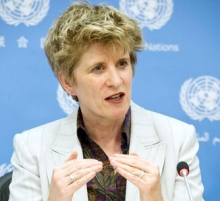Right to Health: “an enabler of other rights”

Concerns for realising the right to health featured prominently in the course of discussions during the 34th session of the United Nations Human Rights Council, which was held on 27 February to 24 March 2017. Kate Gilmore, the Deputy High Commissioner for Human Rights, set the pace for these discussions when she underscored the importance of the right to health, describing it as “an enabler of other rights.”
Policy-makers, civil society organisations, human rights NGOs, experts on trade and intellectual property rights were all part of a panel discussion which reviewed issues arising from the report of the High-Level Panel on Access to Medicines. One third of the world’s population lack access to medicines. Most these are in developing countries. The panelists and discussants emphasized the need for capacity building and technology transfer to enable local production of medicines in low and middle income countries.
There was also a panel discussion on curtailing maternal mortality and morbidity within the context of SDG 3. It was noted that strengthening national health systems with an integrated focus on women and girls is key to reducing and ultimately eliminating preventable maternal mortality and morbidity. This requires well-funded universal public health care, with patients, health workers and communities being involved in decision-making, thus ensuring that health services delivery is people-centred.
Panelists also observed that addressing the social and economic determinants of health is essential to ensuring better maternal and child health. Poverty, malnutrition and disempowering practices were noted to be major obstacles to achieving SDG 3.
The session also witnessed the launch of the report on the realization of the human right and fundamental freedoms of persons with mental health conditions or psychosocial disabilities. The 32nd session of the Council had resolved last July on the need for the report, to identify challenges, opportunities and policy needs to meet this end.
The report reveals increasing awareness and commitment to promoting the rights of persons with mental health conditions. This is quite timely in the light of the World Health Organization’s year-long global “Let’s talk” campaign on depression.

